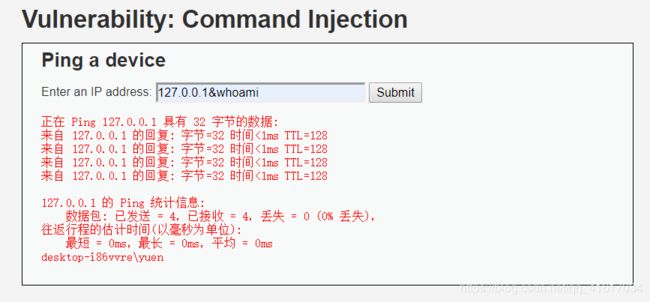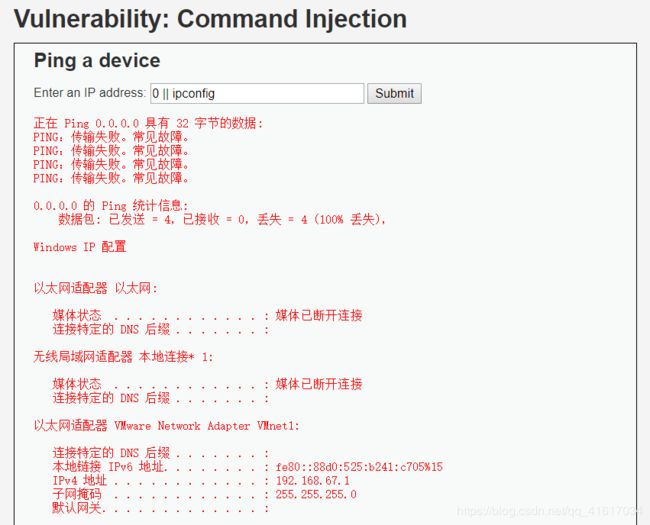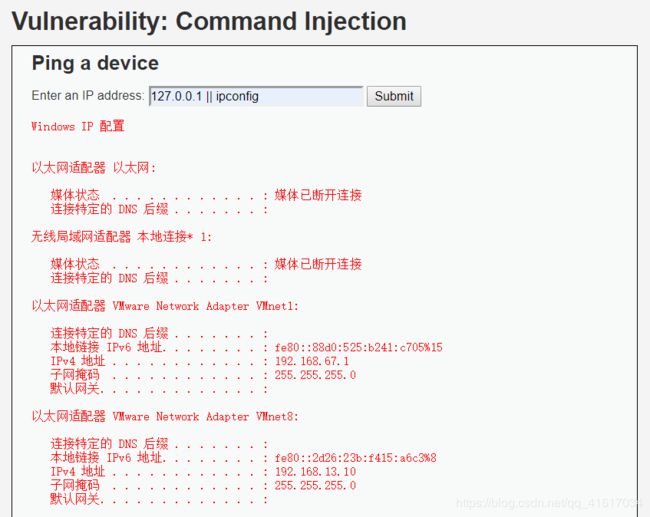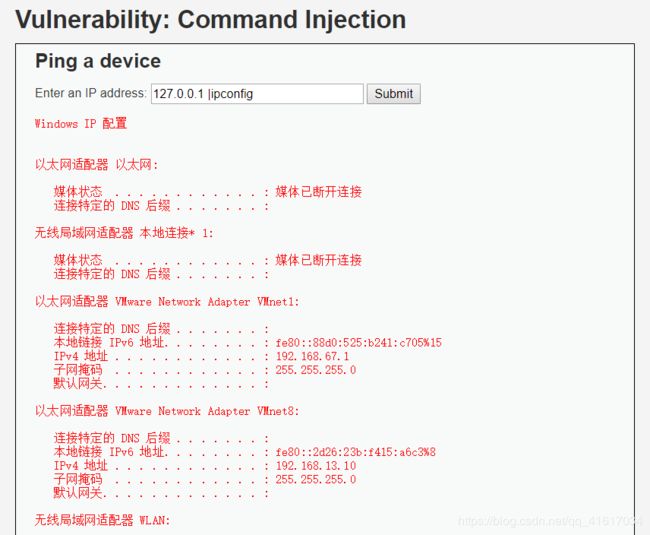DVWA--Command Injection(命令执行)--四个等级
Command Injection,也就是我们常说的命令执行,DVWA共有四个等级
索引目录:
Low
Medium
High
Impossible
命令执行漏洞的原理: :在操作系统中, & 、&& 、| 、 || 都可以作为命令连接符使用,用户通过浏览器提交执行命令,由于服务器端没有对执行函数进行过滤,从而造成可以执行危险命令
PHP的命令执行函数主要有: :system、exec、passthru、shell_exec与’ '(这个并不是函数,只是代表他可以执行命令)
常用url编码 :
%20 = 空格
%5c = \
%26 = &
%7c = |
command1 & command2 :不管command1执行成功与否,都会执行command2(将上一个命令的输出作为下一个命令的输入),也就是command1和command2都执行
command1 && command2 :先执行command1执行成功后才会执行command2 ,若command1执行失败,则不执行command2
command1 | command2 :只执行command2
command1 || command2 :command1执行失败,再执行command2(若command1执行成功,就不再执行command2)
Low
源代码:
if( isset( $_POST[ 'Submit' ] ) ) {
// Get input
$target = $_REQUEST[ 'ip' ];
// Determine OS and execute the ping command.
if( stristr( php_uname( 's' ), 'Windows NT' ) ) {
// Windows
$cmd = shell_exec( 'ping ' . $target );
}
else {
// *nix
$cmd = shell_exec( 'ping -n 4 ' . $target );
}
// Feedback for the end user
echo "{$cmd}";
}
?>
stristr(string,search,before_search) :搜索字符串在另一字符串中的第一次出现,返回字符串的剩余部分(从匹配点),如果未找到所搜索的字符串,则返回 FALSE
string 必需。规定被搜索的字符串
search 必需。规定要搜索的字符串
如果该参数是数字,则搜索匹配该数字对应的 ASCII 值的字符
before_search 可选。默认值为 “false” 的布尔值
如果设置为 “true”,它将返回 search 参数第一次出现之前的字符串部分
注释:该函数是二进制安全的
注释:该函数是不区分大小写的,如需进行区分大小写的搜索,请使用 strstr() 函数
举例:
echo stristr("Hello world!","WORLD");
?>
/*结果
world!
*/
php_uname ($mode) :返回运行 PHP 的系统的有关信息,也就是返回运行 PHP 的操作系统的描述
$mode 是单个字符,用于定义要返回什么信息:
‘a’:此为默认。包含序列 “s n r v m” 里的所有模式
‘s’:操作系统名称。例如: FreeBSD
‘n’:主机名。例如:DESKTOP-XXXXXXX
‘r’:版本名称,例如: 5.1.2-RELEASE
‘v’:版本信息。操作系统之间有很大的不同
‘m’:机器类型。例如:i386
shell_exec() :通过 shell 环境执行命令,并且将完整的输出以字符串的方式返回。也就是说, PHP先运行一个shell环境, 然后让shell进程运行你的命令, 并且把所有输出已字符串形式返回, 如果程序执行有错误或者程序没有任何输出, 则返回null

Low级别的代码对提交的参数没有进行过滤,仅仅使用使用stristr与php_uname判断操作系统是否是Windows NT,因此我们可以使用命令连接符来实现命令执行
渗透测试:

command1 && command2 :先执行command1后执行command2

command1 & command2 :先执行command2后执行command1

command1 | command2 :只执行command2

command1 || command2 :command1执行失败,再执行command2(若command1执行成功,就不再执行command2)


Medium
源代码:
if( isset( $_POST[ 'Submit' ] ) ) {
// Get input
$target = $_REQUEST[ 'ip' ];
// Set blacklist
$substitutions = array(
'&&' => '',
';' => '',
);
// Remove any of the charactars in the array (blacklist).
$target = str_replace( array_keys( $substitutions ), $substitutions, $target );
// Determine OS and execute the ping command.
if( stristr( php_uname( 's' ), 'Windows NT' ) ) {
// Windows
$cmd = shell_exec( 'ping ' . $target );
}
else {
// *nix
$cmd = shell_exec( 'ping -n 4 ' . $target );
}
// Feedback for the end user
echo "{$cmd}";
}
?>
array() :用于创建数组
在 PHP 中,有三种类型的数组:
索引数组 - 带有数字索引的数组
关联数组 - 带有指定的键的数组
多维数组 - 包含一个或多个数组的数组
说明:
array() 创建数组,带有键和值。如果在规定数组时省略了键,则生成一个整数键,这个 key 从 0 开始,然后以 1 进行递增
要用 array() 创建一个关联数组,可使用 => 来分隔键和值
要创建一个空数组,则不传递参数给 array():
$new = array();
关联数组举例:
$age=array("Bill"=>"1","Steve"=>"2","Mark"=>"3");
echo "Bill is " . $age['Bill'] . " years old.";
?>
/*结果:
Bill is 1 years old.
*/
str_replace(find,replace,string,count) :以其他字符替换字符串中的一些字符(区分大小写)
find 必需。规定要查找的值
replace 必需。规定替换 find 中的值的值
string 必需。规定被搜索的字符串
count 可选。对替换数进行计数的变量
该函数必须遵循下列规则:
如果搜索的字符串是数组,那么它将返回数组
如果搜索的字符串是数组,那么它将对数组中的每个元素进行查找和替换
如果同时需要对数组进行查找和替换,并且需要执行替换的元素少于查找到的元素的数量,那么多余元素将用空字符串进行替换
如果查找的是数组,而替换的是字符串,那么替代字符串将对所有查找到的值起作用
注释:该函数区分大小写。请使用 str_ireplace() 函数执行不区分大小写的搜索
注释:该函数是二进制安全的
举例:
echo str_replace("world","Shanghai","Hello world!");
?>
/*结果:
Hello Shanghai!
*/
array_keys(array,value,strict) :返回包含数组中所有键名的一个新数组
array 必需。规定数组
value 可选。您可以指定键值,然后只有该键值对应的键名会被返回
strict 可选。与 value 参数一起使用。可能的值:
true - 返回带有指定键值的键名。依赖类型,数字 5 与字符串 “5” 是不同的
false - 默认值。不依赖类型,数字 5 与字符串 “5” 是相同的
如果提供了第二个参数,则只返回键值为该值的键名
如果 strict 参数指定为 true,则 PHP 会使用全等比较 (===) 来严格检查键值的数据类型
举例:
$a=array("x"=>"A","y"=>"B","z"=>"C");
print_r(array_keys($a));
?>
/*结果:
Array ( [0] => x [1] => y [2] => z )
*/
过滤核心代码理解:
array_keys( $substitutions )为Array ( [0] => && [1] => ; ) ,也就是arry(&& , ;)
$substitutions为 $substitutions = array( '&&' => '', ';' => '', ),&&和;是键,''为键值,转换一下也就是array( [0] => '', [1] => '', ),再转化一下就是arry('','')
假设$target=127.0.0.1 && ipconfig
解释1:$target = str_replace( arry(&& , ;), arry( '&&' => '', ';' => '', ), "127.0.0.1 && ipconfig" );搜索"127.0.0.1 && ipconfig"中的&&和;
替换成数组arry( '&&' => '', ';' => '', )中&&与;对应的值
那么str_replace()函数会将$target中的&&和;替换为''
解释2:$target = str_replace( arry(&& , ;), arry('',''), "127.0.0.1 && ipconfig" );搜索"127.0.0.1 && ipconfig"中的&&和;
替换成''
注:这里的解释1和解释2只是为了帮助理解
因此,从Medium的源代码可以看出,它在Low代码层面上增加了对上传参数的过滤,将上传参数的&&和;转化为空,但是它仅仅只能过滤&&和;,我们可以使用&继续进行命令执行
High
源代码:
if( isset( $_POST[ 'Submit' ] ) ) {
// Get input
$target = trim($_REQUEST[ 'ip' ]);
// Set blacklist
$substitutions = array(
'&' => '',
';' => '',
'| ' => '',
'-' => '',
'$' => '',
'(' => '',
')' => '',
'`' => '',
'||' => '',
);
// Remove any of the charactars in the array (blacklist).
$target = str_replace( array_keys( $substitutions ), $substitutions, $target );
// Determine OS and execute the ping command.
if( stristr( php_uname( 's' ), 'Windows NT' ) ) {
// Windows
$cmd = shell_exec( 'ping ' . $target );
}
else {
// *nix
$cmd = shell_exec( 'ping -n 4 ' . $target );
}
// Feedback for the end user
echo "{$cmd}";
}
?>
High的代码也就是在Medium的代码上面进行了一次升级,增加了过滤的黑名单,但是,我们仔细看源代码会发现,本来可以过滤一个|,就可以过滤所有|、||、|||等等,可是你仔细观察一下,会发现过滤的|后面有一个空格,也就表示,它过滤的是|空格,并没有过滤|,所以我们可以利用|进行绕过
渗透测试:
绕过方法一:

看了上面一幅图,大家也许就会有疑惑了,明明源代码里有过滤||,为什么还能执行呢?
我们仔细看一下它的黑名单:

从上面可以看出,它确实有过滤||,但是,你注意到了顺序吗!!它是由上到下依次查找转义,它首先转义|空格
所以127.0.0.1 || ipconfig经过过滤后就是127.0.0.1 |ipconfig,这里的|是原命令语句(127.0.0.1 || ipconfig)左边的,因此,最后的执行命令便成了127.0.0.1 |ipconfig
如果我们把黑名单过滤的顺序修改一下会怎样呢?如下图:

执行结果:

此时我们会发现无法执行,因为它首先过滤了||
Impossible
源代码:
if( isset( $_POST[ 'Submit' ] ) ) {
// Check Anti-CSRF token
checkToken( $_REQUEST[ 'user_token' ], $_SESSION[ 'session_token' ], 'index.php' );
// Get input
$target = $_REQUEST[ 'ip' ];
$target = stripslashes( $target );
// Split the IP into 4 octects
$octet = explode( ".", $target );
// Check IF each octet is an integer
if( ( is_numeric( $octet[0] ) ) && ( is_numeric( $octet[1] ) ) && ( is_numeric( $octet[2] ) ) && ( is_numeric( $octet[3] ) ) && ( sizeof( $octet ) == 4 ) ) {
// If all 4 octets are int's put the IP back together.
$target = $octet[0] . '.' . $octet[1] . '.' . $octet[2] . '.' . $octet[3];
// Determine OS and execute the ping command.
if( stristr( php_uname( 's' ), 'Windows NT' ) ) {
// Windows
$cmd = shell_exec( 'ping ' . $target );
}
else {
// *nix
$cmd = shell_exec( 'ping -n 4 ' . $target );
}
// Feedback for the end user
echo "{$cmd}";
}
else {
// Ops. Let the user name theres a mistake
echo 'ERROR: You have entered an invalid IP.
';
}
}
// Generate Anti-CSRF token
generateSessionToken();
?>
explode(separator,string,limit) :把字符串打散为数组
| 参数 | 描述 |
|---|---|
| separator | 必需。规定在哪里分割字符串 |
| string | 必需。要分割的字符串 |
| limit | 可选。规定所返回的数组元素的数目。可能的值:(1)大于 0 - 返回包含最多 limit 个元素的数组;(2)小于 0 - 返回包含除了最后的 -limit 个元素以外的所有元素的数组;(3)0 - 返回包含一个元素的数组 |
举例:
$str = "Hello world. I love Shanghai!";
print_r (explode(" ",$str));
?>
/*结果
Array ( [0] => Hello [1] => world. [2] => I [3] => love [4] => Shanghai! )
*/
is_numeric($var) :用于检测变量是否为数字或数字字符串
$var要检测的变量
如果指定的变量是数字和数字字符串则返回TRUE,否则返回FALSE
sizeof(array,mode) :计算数组中的单元数目或对象中的属性个数
array 必需。规定数组
mode 可选。规定模式。可能的值:
0 - 默认。不计数多维数组中的所有元素
1 - 递归地计数数组中元素的数目(计算多维数组中的所有元素)
当变量未被设置,或是变量包含一个空的数组,该函数会返回 0。可使用 isset() 变量来测试变量是否被设置
举例:
$cars=array("Volvo","BMW","Toyota");
echo sizeof($cars);
?>
/*结果
3
*/
Impossible级别的代码加入了Anti-CSRF token,并对提交的参数进行严格的过滤,不仅过滤了反斜杠;也使用is_numeric检测变量是否为数字字符串或数字,使得非数字字符串或数字的全部“封杀”,从而达到阻止危险的命令执行
注:这所有源代码中的的ping -c 4 ip现在已经不适用了,现在windows的版本应该是ping - n 4 ip了,我都已经在源代码中修改了



